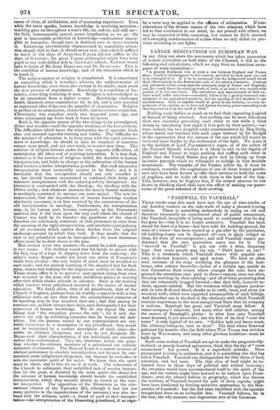" FAREWELL TO VAUXHALL."
THESE words must this week have met the eye of nine-tenths of our London readers, on the side-walls of many a placard-bearing vehicle. There is something melancholy in seeing an old and therefore necessarily an experienced place of public amusement, like Vauxhall, incapable of being made to understand that its day has gone by—that it is no longer attractive. Vauxhall has been closed for want of a lessee—has been sold for building-ground, for want of a lessee—has been opened as a pis-aller by the purchaser, till building-leases can be disposed of—now is again obliged to close, for want of encouragement ; and still Vauxhall cannot un- derstand that the new generation cares not for it. The " farewell to Vauxhall" is put out with a faint, desperate hope that some people may cry out, " Don't leave us yet! " This is a weakness which Vauxhall shares with popular ora- tors, ci-devant beauties, and aged actors. We have so often seen veterans of the stage revisiting the glimpses of the foot- lamps, after solemn farewells—ladies of a certain age, unable to tear themselves from scenes where younger fair ones have en- grossed the attentions once paid to them—orators, once run after, thinning meetings by their uprising—and all of them protesting that they are reluctantly dragged forward—that their folly, however te- dious, appears natural. But the weakness which appears pardon- able in vain flesh and blood, shocks us in earth, trees, and stone (or wooden) walls, which were supposed unsusceptible of such failings. And therefore one is shocked at the obstinacy with which Vauxhall remains impervious to the most unequivocal hints that its company is tedious. Ranelagh has gone, and Vauxhall must follow. A water-company's reservoir, and many other dull utilities, occupy the scenes of Ranelagh's glories : to what base uses Vauxhall must descend, is yet uncertain ; but the fate of its rival "over the water" is only typical of its own. " Golden lads and lasses must, like chimney-sweepers, turn to dust." The field where SIMPSON gathered his laurels—like the field where WAT TYLER was stricken down by WaLwoare, and many other glorious localities—must be built upon.
Such cases as that of Vauxhall are apt to make the pragmatically- inclined, or moody-hearted epicureans, think that the day of " mere amusement" has passed. It is a superficial mistake. Mere amusement is rising in estimation, and it is something else that has killed Vauxhall. Vauxhall was distinguished for thin slices of beef, extortion, and bad taste. The thin slice of beef might be to- lerated even in these days of political and critical economy; the extortion would have accommodated itself to the spirit of the age, and the waiters might have learned to be waiters upon Provi- dence; even the altered fashion in geography, which has thrown the territory of Vauxhall beyond the pale of terra cognita, might have been combated by forming seductive approaches to the Hes- perides of Lambeth : but the bad taste identified with the operatic tea-gardens drew on an invincible fate. Vauxhall follows, far in the rear, the vile costume and degenerate arts of the GEORGRS.


























 Previous page
Previous page